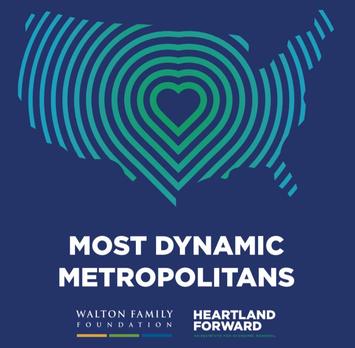
Today, the Walton Family Foundation released “The Most Dynamic Metropolitans,” new research ranking the economic performance of metropolitan areas in the Heartland and across the country. The study demonstrates that a knowledge-based economy spurs economic growth in metropolises across the United States. Metro areas with knowledge-based economies ranked higher than cities that have yet to make much-needed investments in technology, education, entrepreneurship and commercialization. To read “The Most Dynamic Metropolitans” executive summary, click here.
“The data show that a knowledge-based economy is key to unlocking economic potential in metropolitan areas across the United States,” said Ross DeVol, the lead researcher and a Walton Fellow. “Cities making investments in a knowledge-based economy have performed better economically than those that have not.”
“Technology sectors are under-represented, and too little emphasis is placed on supporting entrepreneurs in Heartland metropolitan areas,” DeVol continued. “Investors must be willing to support early-stage firms, and more universities need to embrace commercialization as a critical part of their mission and educational attainment, particularly in science, technology, engineering and mathematics (STEM) for economic progress in the Heartland and throughout the nation.”
Each metropolitan area is ranked and reviewed on performance-based metrics, such as job growth, income gains, and the proportion of total jobs at young firms – a key measure of entrepreneurial performance. This is the first time that such research has been undertaken in this scope.
“The Most Dynamic Metropolitans” measured key data and ranked 379 metropolitan areas across the United States. The top 10 metropolitan areas for economic performance are:
- Midland, Texas
- San Jose-Sunnyvale-Santa Clara, California
- Midland, Michigan
- Elkhart-Goshen, Indiana
- Bend-Redmond, Oregon
- St. George, Utah
- Austin-Round Rock, Texas
- Greeley, Colorado
- San Francisco-Oakland-Hayward, California
- Seattle-Tacoma-Bellevue, Washington
The study also considered the cities by population size:
- large-sized metropolitans (more than 1 million people),
- medium-sized metropolitans (500,000 to 999,999 people); and,
- small-sized metropolitans (up to 499,999 people).
To read the full rankings, click here.
Later this year, DeVol and a team of economic researchers will expand their efforts and transition to a new organization, Heartland Forward, a think and do tank whose primary mission is to improve economic performance in the center of the United States by advocating fact-based solutions to foster job creation, knowledge-based and inclusion growth and improved health status. Heartland Forward will pursue its mission through independent, data-driven research, action-oriented convenings, such as the Heartland Summit, and impactful policy recommendations.
About the Walton Fellows Program
The Walton Fellows Program is term-limited, with up to one year in residence. Fellows are responsible for internal and external thought leadership and will conduct research and/or build and improve processes on behalf of the programs of the Walton Family Foundation. This program does not accept unsolicited applications.
About the Walton Family Foundation
The Walton Family Foundation is, at its core, a family-led foundation. The children and grandchildren of our founders, Sam and Helen Walton, lead the foundation and create access to opportunity for people and communities. We work in three areas: improving K-12 education, protecting rivers and oceans and the communities they support, and investing in our home region of Northwest Arkansas and the Arkansas-Mississippi Delta. In 2018, the foundation awarded more than $595 million in grants in support of these initiatives. To learn more, visit waltonfamilyfoundation.org and follow us on Facebook, Twitter and Instagram.












